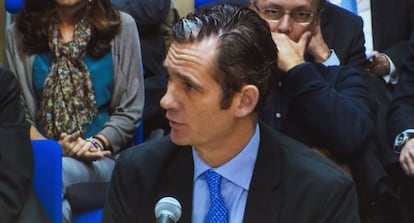Royal Household filed Princess Cristina’s tax returns, husband claims
King’s brother-in-law tells trial that his company was set up to “channel his fees”

The brother-in-law of Spain’s King Felipe VI, Iñaki Urdangarin, returned to face the questions of anti-corruption prosecutors on Wednesday morning as his embezzlement and fraud trial resumed in Palma de Mallorca.
As he did when anti-corruption attorney Pedro Horrach began questioning him on Friday, the former Olympic handball player sought to attribute the day-to-day operations of his Nóos Institute to accountant Miguel Tejeiro and distance himself and his wife, Princess Cristina, from both the non-profit and Aizoon, the company they jointly owned.
Cristina de Borbón carried out no role in the Nóos Institute Iñaki Urdangarin
“Cristina de Borbón carried out no role [in the Nóos Institute],” he said, speaking in a louder voice than he had last week.
He also claimed that he never acted without first running things by the princess’s adviser in the Royal Household, Carlos García Revenga. “I didn’t take a step in my life without consulting with García Revenga, so that he was informed about what we were doing.”
Urdangarin is accused of diverting €4.5 million of €6.2 million that he and his business partner Diego Torres earned in public contracts from the Balearic Islands and Valencia regional government from Nóos to private businesses. He faces up to 19-and-a-half years in prison if found guilty of all the charges against him.
His questioning is expected to last until Thursday, when tax adviser Salvador Trinxet, the alleged architect of the network of companies that supposedly allowed Urdangarin to hide his illicit earnings and evade the corresponding taxes, will take the stand.
After that comes the turn of Cristina de Borbón, who is facing lesser tax fraud charges over allegations she made personal purchases using a company credit card belonging to Aizoon – which is suspected of receiving some of the millions in public funds allegedly diverted from Nóos – and claimed them as deductions in her tax filings.
The infanta, as she is widely known in Spain, is the first member of the Spanish royal family to sit in the dock at a trial.
Prosecutor Horrach was against putting the princess on the stand, but the obscure right-wing labor union Mano Limpias filed a private accusation and is demanding she serve an eight-year prison sentence.
On Friday Urdangarin admitted that Aizoon had hired ghost employees, while stressing that Cristina had nothing to do with its management, which he said was under the control of accountant Marco Tejeiro.
Aizoon was set up in 2003 in order to “channel” the “fees” he earned for his work at the Nóos Institute and attributed its creation to Tejeiro, he said on Wednesday. “I have always trusted Mr Miguel Tejeiro in tax, financial, and accounting matters,” he noted.
Tejeiro was originally charged in the case, but is cooperating with the prosecution.
Asked who was responsible for the infanta's tax filings, Urdangarin replied: “It has always been the responsibility of Mr Federico Rubio, he is an adviser who came on behalf of the Royal Household.”
Last week Urdangarin’s former business partner Torres testified that the business deals at the Nóos Institute were overseen by Spain’s Royal Household, alleging that meetings were held between Tejeiro and the legal adviser to former Spanish King Juan Carlos, José Manuel Romero, the Count of Fontao.
On Wednesday Urdangarin said that it was Romero who had asked him and his wife to leave Nóos in March 2006 because “certain worrying or concerning questions had arisen in parliament. In one of the many periodic meetings that we had, he asked me, my wife and Mr García Revenga to sever our ties with the board of directors.”
English version by Nick Funnell.
Tu suscripción se está usando en otro dispositivo
¿Quieres añadir otro usuario a tu suscripción?
Si continúas leyendo en este dispositivo, no se podrá leer en el otro.
FlechaTu suscripción se está usando en otro dispositivo y solo puedes acceder a EL PAÍS desde un dispositivo a la vez.
Si quieres compartir tu cuenta, cambia tu suscripción a la modalidad Premium, así podrás añadir otro usuario. Cada uno accederá con su propia cuenta de email, lo que os permitirá personalizar vuestra experiencia en EL PAÍS.
¿Tienes una suscripción de empresa? Accede aquí para contratar más cuentas.
En el caso de no saber quién está usando tu cuenta, te recomendamos cambiar tu contraseña aquí.
Si decides continuar compartiendo tu cuenta, este mensaje se mostrará en tu dispositivo y en el de la otra persona que está usando tu cuenta de forma indefinida, afectando a tu experiencia de lectura. Puedes consultar aquí los términos y condiciones de la suscripción digital.








































